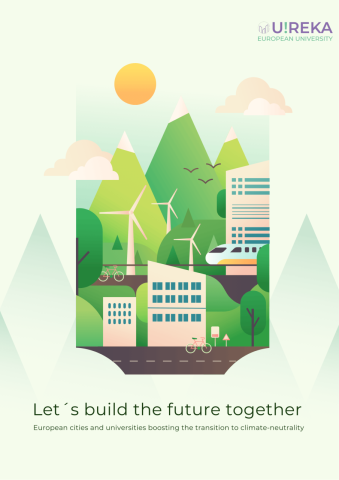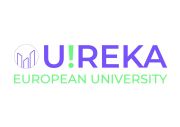
The workshop focuses on the unique role universities play in supporting cities through climate transition. It showcases best practices from the cities of Helsinki and Ghent with the urban-focused European university alliance U!REKA to accelerate climate-neutrality. The speakers from the cities and Amsterdam University of Applied Sciences will explain how universities beyond research and innovation activities bring a skills dimension to the climate challenge. The workshop features an interactive discussion with a Q&A, a live survey on city-university collaboration, and a group reflection on the results. The moderator from EURASHE will summarize key insights and takeaways for inspiration.
- Circular economy | Climate and environment | Education and culture | EU/ European | Governance and Public administration | Local and regional | Research and Innovation | Sustainable | Urban
- Code: 14WS252112
- Square Brussels, 313-315
Speakers
Moderator
Practical information
- When
-
Tue 14/10/2025, 14:00 - 15:00 CET
- Where
- Square Brussels, 313-315
- Type of partnership
- Partnership
- Format
- Workshop
- Theme
-
Cities building tomorrow
- Language
- English

Partners

Metropolia University of Applied Sciences

HOGENT

Eli network U!REKA
Reporting
Session summary
Key Messages and Highlights
The workshop explored different ways how strategic city-university collaboration can truly support cities to meet their ambitious climate objectives. The workshop explored the topic from the point of view of the strategic collaboration established under the U!REKA European University, bringing together representatives from different partner organisations of the alliance: City of Helsinki, City of Ghent and Amsterdam University of Applied Sciences. The Secretary-General of EURASHE moderated the session.
Introduction
The Vice-President of Amsterdam University of Applied Sciences, Dr. Geleyn Meijer, introduced the core mission and history behind the U!REKA European University. The network was initially established in 2016 and later established as one of the European University alliances in 2024. The alliance is mainly composed of universities of applied sciences as academic partners, but the alliance also brings together big metropolitan cities across Europe and a wide range of other regional stakeholders. This collaborative dimension was emphasized as the heart of U!REKA in the workshop.
Iina Oilinki, Climate Expert from the City of Helsinki, highlighted the strategic climate objectives of the City of Helsinki as one of the 112 selected “EU Mission Cities”, before listing achievements concerning the reduction of emissions from heating and buildings. She also pointed out to a new EU-funded collaborative RDI project 4A4PEDs encompassing several U!REKA partners including the City of Helsinki and Metropolia UAS. The Horizon Europe project is focused on energy resilience and positive energy districts, and it involves several European cities as living labs.
Linde Vertriest, Policy Officer from the City of Ghent, highlighted the continued commitment of City of Gent towards their climate objectives, although they were not accepted as one of the “EU Mission Cities”. U!REKA European University provides an interesting collaboration opportunity for city partners as some are affiliated with the 112 Mission Cities, and others are eager to follow their example. She gave key highlights into the “ReWild” project on accelerating urban greening efforts, involving partners such as HOGENT and the City of Ghent, with the aim to serve as a model to other European cities such as Helsinki. She also shared interesting steps how to build a successful ecosystem of project partners in an urban context.
Key message: Universities of Applied Sciences speak a language that is close to the citizens and regional stakeholders; sustainable and close dialogue is a fundamental aspect of a successful city-university collaboration towards solving urban challenges.
Cities have a demand for future-proof urban professionals that can address complex interdisciplinary climate challenges in cities. The U!REKA European University can address this demand by pooling knowledge together and develop new education and training programmes, courses and learning modules, via enhanced collaboration between the European partner universities and their regional stakeholders - particularly cities. Furthermore, close dialogue with citizens and regional stakeholders is important when fostering new ideas for future RDI collaboration topics and when co-creating new climate solutions to address urban challenges.
Key message: The strategic city-university collaboration within the U!REKA European University can enhance the visibility and impact of new climate solutions in the every-day lives of citizens and cities.
As an alliance of universities of applied sciences, U!REKA contributes to the development of specific climate solutions, based on a multi-stakeholder approach (“quadruple helix”), with focus on education, research, innovation and service to society. It fosters specific ecosystem-based collaboration that supports close connections between researchers, teachers and students at the partner universities as well as their regional stakeholders - particularly cities.
The importance of involving citizens to adopt innovation and solutions was emphasized in the workshop, to promote the societal acceptance of new climate solutions. Furthermore, the visibility of the project results as well as knowledge valorisation was emphasized. The workshop highlighted a demand to measure the impact of EU-funded RDI projects on other metrics besides scientific publications and rankings - particularly linked to the practical applicability of results.
Key message: The U!REKA European University can act as a facilitator between regional innovation ecosystems of their partner universities and foster long-term collaboration and systematic impact between universities and cities - beyond short-term EU-projects.
The Climate Expert from the City of Helsinki and highlighted that cities can greatly benefit from the new ideas and innovations coming from their regional RDI partners like Metropolia UAS. Sometimes universities can really impact the policy discussions in cities to support evidence-based policymaking, even in cases where there is little political will at first. The added value of U!REKA can really emerge from the benefits related to the transnational replication of joint RDI results as well as cross-border knowledge exchange to raise awareness.
The Climate Expert from the City of Ghent highlighted that it is important to first identify the thematic and regional expertise that exists within your urban and regional ecosystems and the challenges that they are trying to solve. Universities of Applied Sciences are well connected actors within their regional ecosystems, and they are great partners to connect and scale up collaboration at the European level - such as though U!REKA.
Dr. Geleyn Meijer emphasized that it is important to make the leap from project-based collaboration to a deeper thematic-focused approach on RDI collaboration. For city-university partnerships, this would signify a shift from “occasional dating” into a “happy marriage”. The added value of U!REKA comes from combining the joint expertise of different HEI partners, achieving sometimes unexpected synergies and co-creating new innovative solutions - replicable in other European cities and ecosystems.
Audience Engagement and Questions asked via the Mentimeter:
If your university and city were in a relationship, how would you describe it?
A happy marriage: 7 answers
Occasional dating: 17 answers
It's complicated: 6 answers
In couples' therapy: 1 answer
I don't know: 1 answer
What should be the role of universities when collaborating with cities towards reaching climate goals?
Train climate-smart professionals: 10 answers
Drive research & innovation: 23 answers
Facilitate cross-sector collaboration: 11 answers
Catalyse citizen engagement: 10 answers
Support evidence-based policies: 10 answers
Which of the following is the biggest barrier for university-city collaboration?
Lack of long-term funding: 21 answers
Misaligned priorities: 20 answers
Bureaucratic hurdles: 13 answers
Short EU project timelines: 8 answers
Lacking involvement of civil society: 8 answers
Other: 7 answers
On which theme would you like to see more intensified European collaboration between cities and universities?
Climate action & smart cities: 15 answers
Skills development & lifelong learning: 5 answers
Innovation & entrepreneurship: 5 answers
Social inclusion: 4 answers
Management of knowledge & innovation ecosystems: 8 answers
Other: 1 answers
Quotes
-
"Universities of Applied Sciences speak a language that is closer to the citizens and regional stakeholders; sustainable and close dialogue is a fundamental aspect of a successful city-university collaboration towards solving urban challenges."
"The U!REKA European University can promote a shift into a deeper thematic-focused approach on RDI collaboration between cities and universities - as opposed to short-term project-based collaboration."
"We have a happy marriage between the City of Helsinki and Metropolia UAS. Our Mayor meets regularly with the university representatives in our city to sustain dynamic collaboration"
Additional links
https://www.metropolia.fi/en/rdi/rdi-projects/4a4peds
https://ureka.eu/the-importance-of-applied-research-on-the-way-to-green-and-sustainable-cities/






